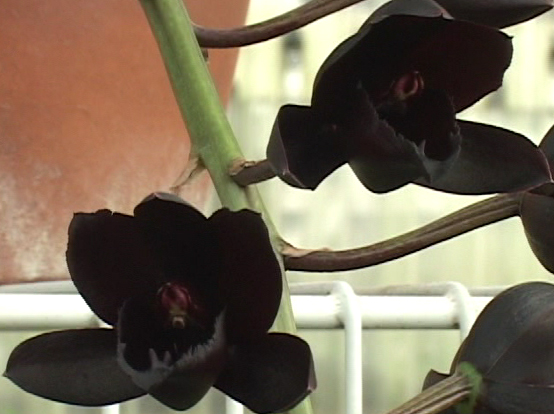
The Black Orchid. Photo courtesy of Rich Walton.
This weekend, the Art Theatre will be screening The Judge, the Hunter, the Thief and the Black Orchid, a locally-made documentary about not just the titular Black Orchid, but also the intricate world behind a flower that many of us only see lined up like suspects at Lowes.
Director and Producer Rich Walton’s documentary follows an orchid hybridizer, one of a dying breed, Fred Clarke. Clarke—who created the one-of-a-kind Black Orchid—explains why his hybridization is unique, but also why his profession is slowly withering.
Along the way Walton, a Long Beach resident, shows us the perspective from other rival growers—the passionate and the businessmen alike—as well as views from all aspects of the orchid world.
“It’s actually quite interesting,” Walton says of how he began his investigation of the orchid community. “It was all right here in Long Beach.” Walton had discovered that Long Beach was home to two different Orchid Societies—the Long Beach Amateur Orchid Society and the South Coast Orchid Society. From there he was introduced to Clarke and his Black Orchid, who ends up being almost the protagonist of the documentary.
Also central to Walton’s film and the orchid world as a whole is the Convention on International Trade in Endangered Species of Wild Fauna and Flora. CITES, as it is called, is presented as a way of conserving species (orchids included) by outlawing their trade, importation and exportation from the 173 countries participating in it.
CITES finds its way into all aspects of the orchid world, garnering criticism from collectors, hunters and judges. Orchid enthusiasts and professionals both explain how CITES is counter-productive to the propagation of orchids and how smuggling has been the only option of acquiring new species.
Featured in Walton’s documentary are the judges from the American Orchid Society and how the accolades they award to flowers can help the legitimacy of a particular species of orchid and also boost the reputation of the grower, which is crucial to growers like Clarke.
The documentary culminates in the World Orchid Conference of 2008 in Florida, showcasing the popularity and vastness of the orchid growing world. And what awards ceremony would be complete without a conspiracy theory from a slighted entrant?
Despite the popularity of Susan Orlean’s The Orchid Thief, Walton was not as much influenced by that as he was from another book, Orchid Fever, by Eric Hansen.
“I wanted something not fictionalized,” Walton says. Even some members of the orchid societies he met with were suspicious at first, he says. These members had felt that The Orchid Thief and later the film Adaptation, had over fictionalized the culture, painting it in an unrealistic light.
Despite those suspicions, Walton found that the societies themselves were not nearly as clandestine as one might think.
“I read that it was very closed door but since I’ve been involved in them they have been very open,” he says. “For the most part they were very friendly and wanted people to know.”
“The Judge, the Hunter, the Thief, and the Black Orchid,” is a fascinating documentary with some very unique perspectives. Decrying the cloned orchids of big box stores, Walton’s film shows how one flower and a pile of conservation laws can lead to some really big things.
The Judge, the Hunter, the Thief and the Black Orchid, will be shown at the Long Beach Art Theatre on Aug. 11 at 12:30pm. Rich Walton and Fred Clarke will be on hand to do a Q&A session after the screening.
For more information about the American Orchid Society visit their website. For more about The Judge, the Hunter, the Thief and the Black Orchid, visit blackorchidmovie.com.

